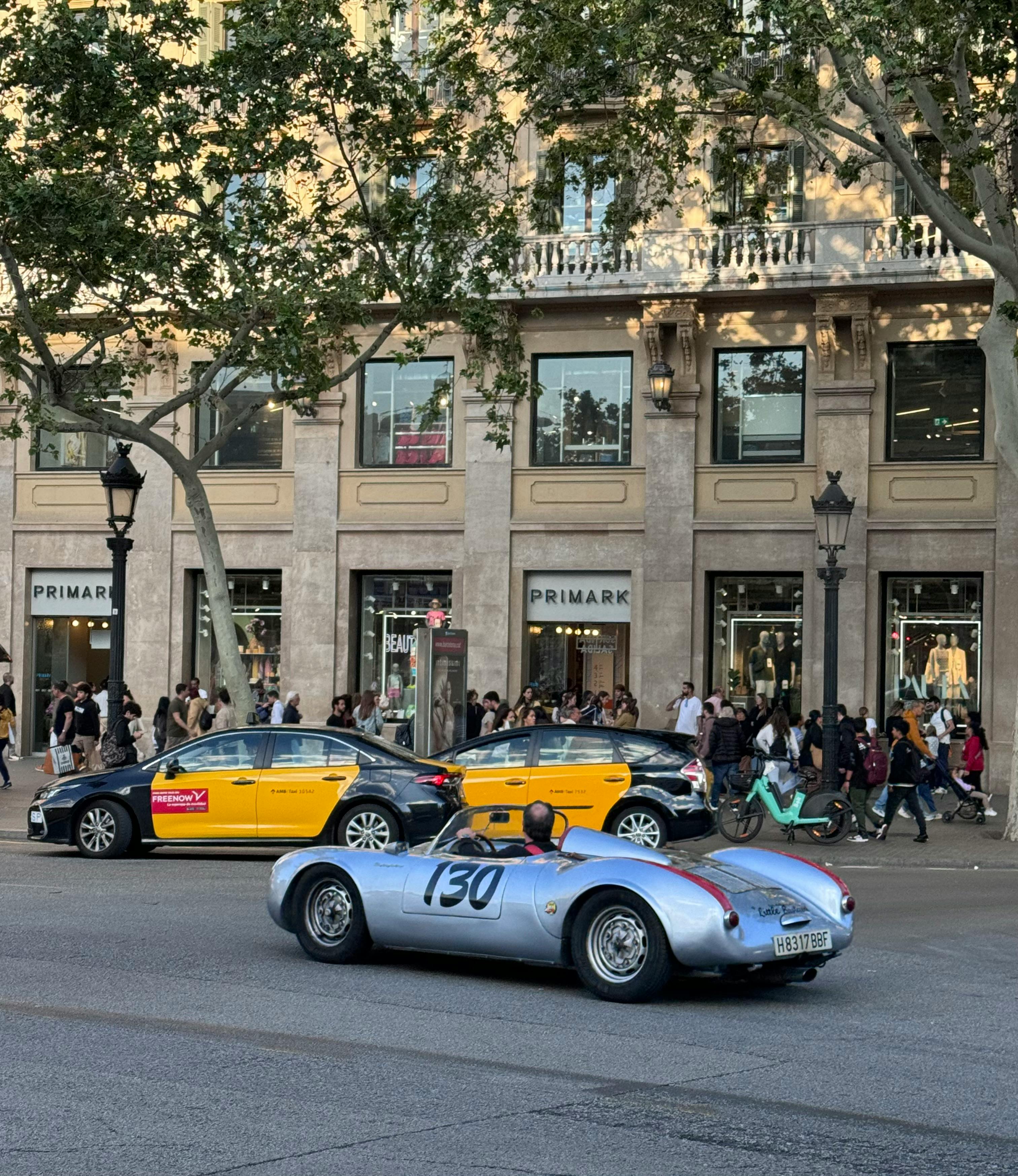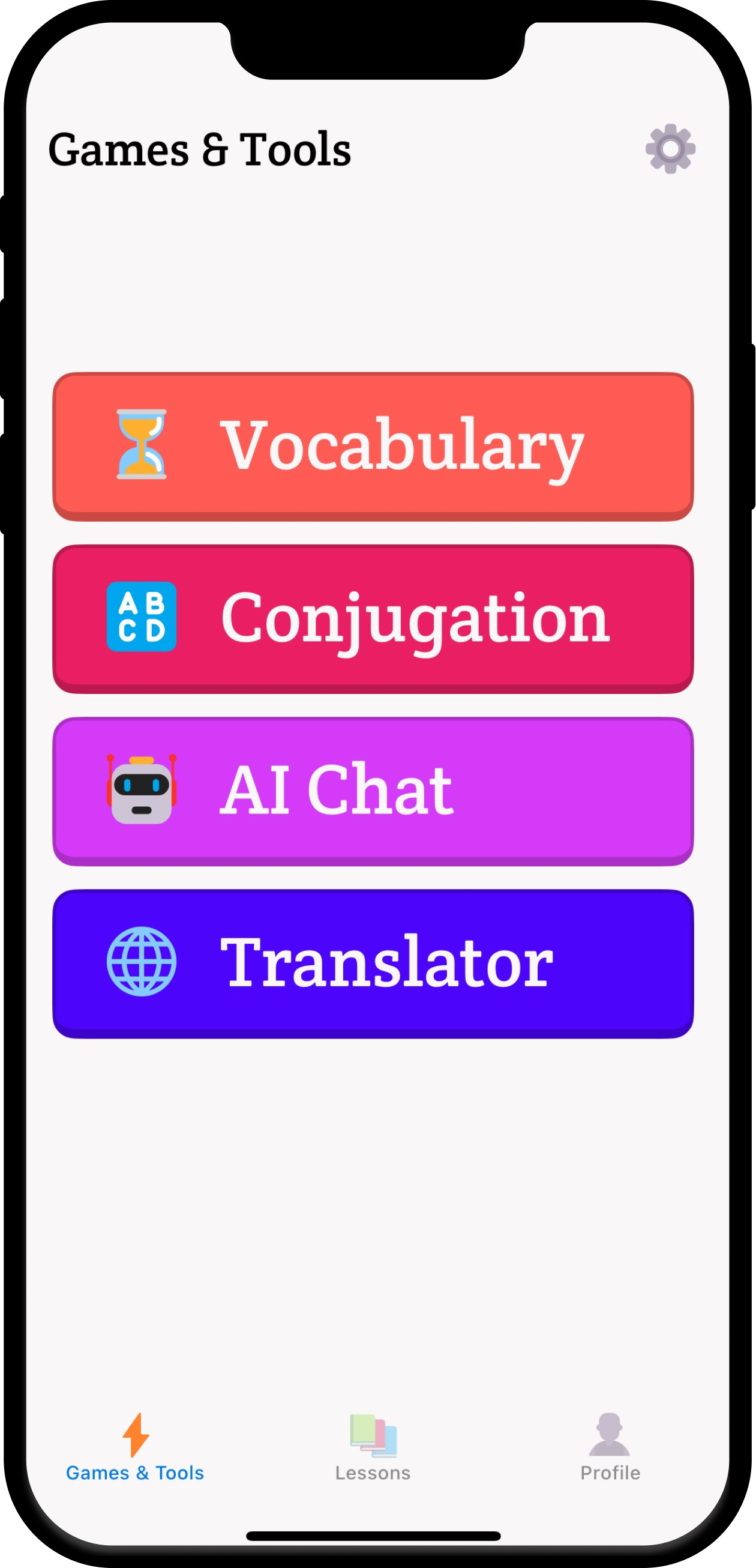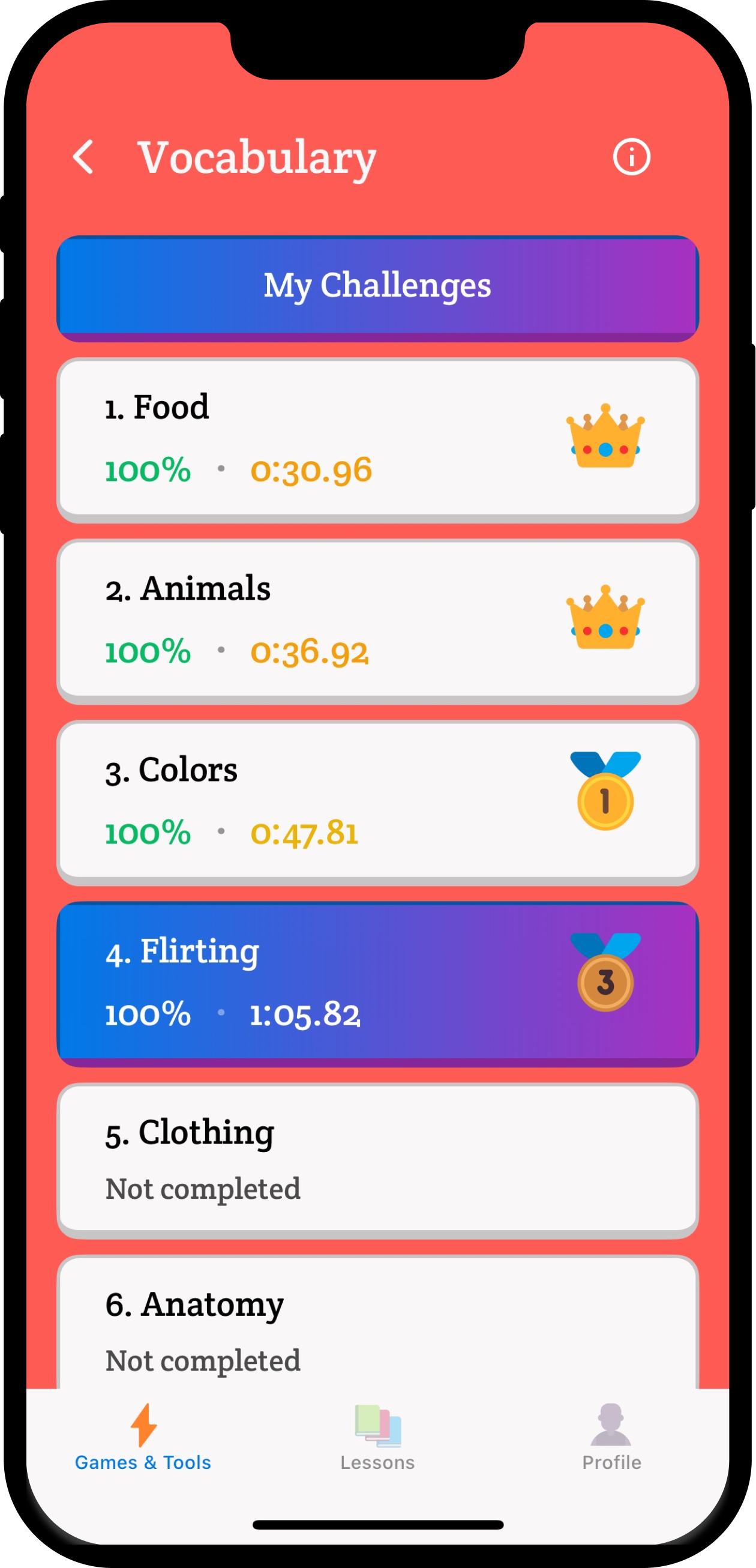100+ Catalan Slang Words and Expressions You Need to Know

Table of Contents
- Common Everyday Slang
- Barcelona & Central Catalonia
- Valencia (Valencià)
- Balearic Islands
- Expressions & Idioms
- Food & Drink Related
- Social & Friendly Terms
- Youth & Modern Slang
- Informal Exclamations
- Vulgar Slang
Ready to Learn More?
Try PolyChat's interactive language learning games and put your new vocabulary to the test!

Games & Tools
Essential tools for every learner

Timed Challenges
Practice vocabulary & conjugation

Interactive Games
Learn through engaging gameplay
Understanding Catalan slang is essential for anyone wanting to connect authentically with the vibrant Catalan-speaking communities across Catalonia, Valencia, the Balearic Islands, Andorra, and parts of France and Italy. While standard Catalan is taught in schools, everyday conversations are rich with regional expressions, colloquialisms, and modern slang that reflect the unique cultural identity and contemporary life of Catalan speakers. This comprehensive guide introduces you to 100+ essential Catalan slang words and expressions from different regions.
Common Everyday Slang
- Tio/Tia: Dude, guy/girl (literally uncle/aunt). Ei, tio, com vas? (Hey dude, how are you?)
- Noi/Noia: Boy/girl, guy/chick. Aquell noi és molt simpàtic. (That guy is very nice.)
- Xaval/Xavala: Kid, young person. Els xavals juguen al carrer. (The kids are playing in the street.)
- Paio: Guy, dude. Aquest paio és molt divertit. (This guy is very funny.)
- Tipa: Girl, chick. La tipa aquella és guapa. (That girl is pretty.)
- Guai: Cool, awesome. Quin guai que és! (How cool it is!)
- Xulo: Cool, nice (can also mean cocky). Què xulo el teu cotxe! (How cool your car is!)
- Genial: Great, awesome. Ha estat genial! (It was awesome!)
- Flipant: Amazing, mind-blowing. La pel·lícula és flipant. (The movie is amazing.)
- Brutal: Awesome, intense. El concert va ser brutal. (The concert was awesome.)
- Pasta: Money (literally pasta). No tinc pasta. (I don't have money.)
- Parné: Money, cash. Necessito parné. (I need cash.)
- Curro/Currar: Work/to work. Vaig a currar. (I'm going to work.)
- Mogollón: A lot, loads. Hi ha mogollón de gent. (There are loads of people.)
- Flipar: To be amazed, to freak out. Vaig flipar amb la notícia. (I freaked out with the news.)
- Petó: Kiss. Dóna'm un petó. (Give me a kiss.)
- Casa: House, home. Vens a casa? (Are you coming home?)
- Cotxe: Car. El meu cotxe s'ha espatllat. (My car broke down.)
- Collons: Balls (vulgar, but very common). Quins collons! (What balls!/No way!)
Barcelona & Central Catalonia
- Txapó: Well done, bravo (from French "chapeau"). Txapó per la feina! (Well done for the work!)
- Maco/Maca: Pretty, cute. Quina noia més maca! (What a cute girl!)
- Xato: Kid, young guy (slightly condescending). Aquest xato no sap res. (This kid doesn't know anything.)
- Pijo: Posh, snobby person. És un pijo de Sarrià. (He's a snob from Sarrià.)
- Barrio: Neighborhood (from Spanish). El meu barrio és tranquil. (My neighborhood is quiet.)
- Penya: Group of friends, gang. La meva penya de sempre. (My usual gang.)
- Xiringuito: Beach bar. Anem al xiringuito. (Let's go to the beach bar.)
- Botellón: Outdoor drinking party. Fem botellón a la platja. (We're having a botellón at the beach.)
- Lió: Mess, chaos. Quin lió que hi ha! (What a mess there is!)
- Merda: Shit. Aquesta merda no funciona. (This shit doesn't work.)
- Cagada: Screw-up, mess. He fet una cagada. (I screwed up.)
- Fotut: Screwed, messed up. Estic fotut. (I'm screwed.)
- Joder: Fck, damn. Joder, quin calor! (Fck, how hot it is!)
Valencia (Valencià)
- Xic/Xica: Boy/girl (Valencian variant). El xic aquell és de València. (That boy is from Valencia.)
- Chaval/Chavala: Kid, young person. Els chavals estan jugant. (The kids are playing.)
- Xiquet/Xiqueta: Child, kid (traditional Valencian). El xiquet és molt espabilat. (The kid is very smart.)
- Rollo: Thing, situation. Quin rollo més avorrit! (What a boring situation!)
- Guapo/Guapa: Good-looking, handsome/pretty. Estàs molt guapa avui. (You look very pretty today.)
- Tronco: Buddy, mate (literally trunk). Ei, tronco, com va? (Hey buddy, how's it going?)
- Colega: Friend, colleague. És el meu colega de classe. (He's my classmate.)
- Piba: Girl, chick (from Argentinian influence). La piba aquella és simpàtica. (That girl is nice.)
- Movida: Scene, thing happening. Quina movida més rara! (What a weird scene!)
- Hortera: Tacky, cheesy. Què hortera és aquest vestit! (How tacky this dress is!)
- Paella: The famous rice dish (obviously from Valencia). Fem paella diumenge. (We're making paella on Sunday.)
- Fallas: Traditional Valencian festival. Les Fallas són increïbles. (The Fallas are incredible.)
Balearic Islands
- Al·lot/Al·lota: Boy/girl (Balearic). L'al·lot és molt simpàtic. (The boy is very nice.)
- Homo: Man, guy (Balearic). Aquest homo és de Mallorca. (This guy is from Mallorca.)
- Dona: Woman (standard, but very common in Balearics). La dona aquella és professora. (That woman is a teacher.)
- Xerrar: To talk, chat (Balearic). Anem a xerrar una estona. (Let's chat for a while.)
- Ensaïmada: Traditional Balearic pastry. L'ensaïmada està boníssima. (The ensaïmada is delicious.)
- Sobrassada: Traditional Balearic sausage. La sobrassada de Mallorca és famosa. (Mallorca's sobrassada is famous.)
- Platja: Beach. Anem a la platja. (Let's go to the beach.)
- Cala: Cove, small beach. Conec una cala secreta. (I know a secret cove.)
- Festa: Party, celebration. Hi ha festa al poble. (There's a party in the town.)
- Revetlla: Night party, celebration. La revetlla de Sant Joan. (Saint John's night party.)
Expressions & Idioms
- Estar de conya: To be joking. Estàs de conya o què? (Are you joking or what?)
- Passar-ho pipa: To have a great time. Ens ho vam passar pipa. (We had a great time.)
- Estar fins als collons: To be fed up (vulgar). Estic fins als collons d'aquesta situació. (I'm fed up with this situation.)
- Fer el gandul: To be lazy. No facis el gandul. (Don't be lazy.)
- Estar penjat: To be crazy/hung up on something. Està penjat d'aquesta noia. (He's hung up on this girl.)
- Tenir mala llet: To be in a bad mood (literally "to have bad milk"). Avui té mala llet. (Today he's in a bad mood.)
- Anar de cul: To be in a hurry/trouble. Vaig de cul amb la feina. (I'm swamped with work.)
- Estar en les beceroles: To be absent-minded. Sempre està en les beceroles. (He's always absent-minded.)
- Fer la pilota: To suck up, brown-nose. Li fa la pilota al cap. (He sucks up to the boss.)
- Anar com un tret: To go very fast. Va com un tret amb la moto. (He goes like a shot on his motorcycle.)
- Estar com una cabra: To be crazy (literally "like a goat"). Està com una cabra. (He's crazy.)
- Tenir els collons ben posats: To have guts (vulgar). Té els collons ben posats. (He has guts.)
- Quedar-se de pedra: To be shocked. Em vaig quedar de pedra. (I was shocked.)
Food & Drink Related
- Birra: Beer. Anem a prendre unes birres. (Let's go have some beers.)
- Canya: Small beer. Una canya, si us plau. (A small beer, please.)
- Vi: Wine. El vi negre és bo. (The red wine is good.)
- Cava: Sparkling wine (Catalan champagne). Obrim una ampolla de cava. (Let's open a bottle of cava.)
- Cafè: Coffee. Vols un cafè? (Do you want a coffee?)
- Cortado: Coffee with milk. Un cortado, si us plau. (A cortado, please.)
- Bocata: Sandwich (from Spanish bocadillo). Fem un bocata per sopar. (Let's make a sandwich for dinner.)
- Entrepà: Sandwich (Catalan term). L'entrepà de pernil està bo. (The ham sandwich is good.)
- Truita: Omelet (especially potato omelet). La truita de patates és típica. (Potato omelet is typical.)
- Pa amb tomàquet: Bread with tomato (iconic Catalan dish). El pa amb tomàquet és deliciós. (Bread with tomato is delicious.)
- Botifarra: Traditional Catalan sausage. La botifarra amb mongetes. (Botifarra with beans.)
- Crema catalana: Traditional Catalan dessert. La crema catalana és el millor postres. (Crema catalana is the best dessert.)
Social & Friendly Terms
- Amic/Amiga: Friend. És el meu millor amic. (He's my best friend.)
- Company/Companya: Companion, partner. La meva companya de feina. (My work partner.)
- Veí/Veïna: Neighbor. El veí del primer és molt amable. (The neighbor on the first floor is very kind.)
- Gent: People. Hi ha molta gent al carrer. (There are many people on the street.)
- Família: Family. La meva família és gran. (My family is big.)
- Germà/Germana: Brother/sister. El meu germà petit. (My little brother.)
- Cosí/Cosina: Cousin. La meva cosina viu a Girona. (My cousin lives in Girona.)
- Padrins: Grandparents. Els meus padrins són de Lleida. (My grandparents are from Lleida.)
- Colla: Group, gang. La colla d'amics de sempre. (The usual group of friends.)
- Equip: Team. L'equip de futbol local. (The local football team.)
Youth & Modern Slang
- Guay: Cool (borrowed from Spanish). Què guay! (How cool!)
- Molón: Cool, awesome. El teu mòbil és molón. (Your phone is cool.)
- Xulo: Cool, flashy. Va molt xulo amb la seva roba. (He goes very flashy with his clothes.)
- Chungo: Bad, dodgy. Aquesta zona és chunga. (This area is dodgy.)
- Flipar: To be amazed. Vaig flipar amb el concert. (I was amazed by the concert.)
- Alucinar: To be amazed, hallucinate. Vaig alucinar amb la pel·lícula. (I was amazed by the movie.)
- Petardejar: To party hard. Ahir vam petardejar molt. (Yesterday we partied hard.)
- Loco/Loca: Crazy (from Spanish). Estàs loco! (You're crazy!)
- Súper: Super, very. Està súper bé! (It's super good!)
- Mega: Very, extremely. És mega divertit. (It's extremely fun.)
- Hype: Excitement (borrowed from English). Hi ha molt hype pel nou iPhone. (There's a lot of hype for the new iPhone.)
- Cool: Cool (borrowed from English). És molt cool. (It's very cool.)
Informal Exclamations
- Ostres: Gosh, wow (literally "oysters"). Ostres, quin cotxe! (Gosh, what a car!)
- Coi: Wow, gosh (euphemism for "coño"). Coi, quina sorpresa! (Wow, what a surprise!)
- Déu meu: My God. Déu meu, què ha passat? (My God, what happened?)
- Mare meva: My mother (exclamation). Mare meva, quina calor! (My mother, how hot it is!)
- Caram: Gosh, wow. Caram, quina casa més gran! (Gosh, what a big house!)
- Redéu: Good Lord. Redéu, quina hora és? (Good Lord, what time is it?)
- Mecagum: Damn it (literally "I shit on..."). Mecagum, he perdut les claus! (Damn it, I lost the keys!)
- La mare que...: The mother who... (beginning of curse). La mare que el va parir! (The mother who gave birth to him!)
- Collons: Damn, balls. Collons, quin fred! (Damn, how cold it is!)
- Merda: Shit. Merda, s'ha trencat! (Shit, it broke!)
Vulgar Slang
- Collons: Balls (very common). Quins collons té! (What balls he has!)
- Cony: Cunt (vulgar). Cony, què fas? (F*ck, what are you doing?)
- Foder: To fck. Que et fotin! (Fck off!)
- Merda: Shit. Aquesta merda no funciona. (This shit doesn't work.)
- Cagar: To shit. Cagar-se de por. (To shit oneself with fear.)
- Puta: Whore. Fill de puta! (Son of a whore!)
- Cabró/Cabrona: Bastard/Bitch. Aquest cabró m'ha enganyat. (This bastard cheated me.)
- Gilipollas: Idiot, jerk. No siguis gilipollas. (Don't be an idiot.)
- Imbècil: Imbecile. Ets un imbècil. (You're an imbecile.)
- Estúpid: Stupid. Què estúpid ets! (How stupid you are!)
- Idiota: Idiot. Aquest idiota no entén res. (This idiot doesn't understand anything.)
- Capullo: Jerk, dickhead. El meu cap és un capullo. (My boss is a jerk.)
Cultural & Traditional Terms
- Castells: Human towers (Catalan tradition). Els castells són patrimoni de la humanitat. (Human towers are world heritage.)
- Sardana: Traditional Catalan dance. Ballarem sardanes a la plaça. (We'll dance sardanas in the square.)
- Barça: FC Barcelona. El Barça és més que un club. (Barça is more than a club.)
- Senyera: Catalan flag. La senyera oneja al balcó. (The Catalan flag waves on the balcony.)
- Diada: Catalan National Day. La Diada és l'11 de setembre. (The Diada is September 11th.)
- Festa Major: Main town festival. La Festa Major del poble. (The town's main festival.)
- Correfoc: Fire run (traditional festival). El correfoc és espectacular. (The fire run is spectacular.)
- Gegants: Giants (traditional festival figures). Els gegants desfilen pel poble. (The giants parade through the town.)
Learn Other Languages from Catalan with PolyChat
Are you a Catalan speaker looking to learn other languages? PolyChat is the perfect app for you! As a Catalan speaker, you have unique advantages when learning certain languages, and PolyChat leverages these connections to accelerate your language learning journey.
Why Catalan Speakers Excel at Learning These Languages:
🇪🇸 Spanish - Sister language! Catalan and Spanish share 85% vocabulary and similar grammatical structures.
🇫🇷 French - Romance cousin with shared Occitan influences and familiar conjugation patterns.
🇮🇹 Italian - Fellow Romance language with many cognates and similar phonetic patterns.
🇵🇹 Portuguese - Another Romance language with familiar verb structures and vocabulary roots.
🇴🇨 Occitan - Historical linguistic cousin still spoken in southern France.
PolyChat's Advantage for Catalan Speakers:
✅ Romance Language Mastery - Excel at Spanish, French, Italian, and Portuguese using your Catalan foundation ✅ Mediterranean Connection - Leverage cultural ties to master Italian and southern French dialects ✅ Iberian Bridge - Use Spanish similarities to learn Portuguese more effectively ✅ Global Reach - Connect with 500+ million Spanish speakers, 280+ million French speakers worldwide
Ready to expand your linguistic horizons? Download PolyChat today and discover how your Catalan language skills can unlock a world of new languages!
PolyChat - The best app to learn languages from Catalan 🏴→🌍
This comprehensive guide captures the essence of Catalan slang across its main regional variations. Catalan slang is particularly rich due to the language's contact with Spanish, French, and Italian, as well as its strong cultural identity and modern influences. The best way to master these expressions is through immersion in Catalan media, conversations with native speakers, and experiencing the vibrant cultural life of Catalan-speaking regions.
Related Posts
100+ Polish Slang Words and Expressions You Need to Know
Master essential Polish slang and colloquial expressions to understand native speakers and sound more natural in everyday conversations.
Read more100 Spanish Slang Words You Need to Know
Learn the most common Spanish slang words and phrases that will help you sound like a native speaker in everyday conversations.
Read more100 French Slang Words and Expressions You Should Know
Discover essential French slang words and expressions that will help you sound more natural and understand everyday conversations with native speakers.
Read more